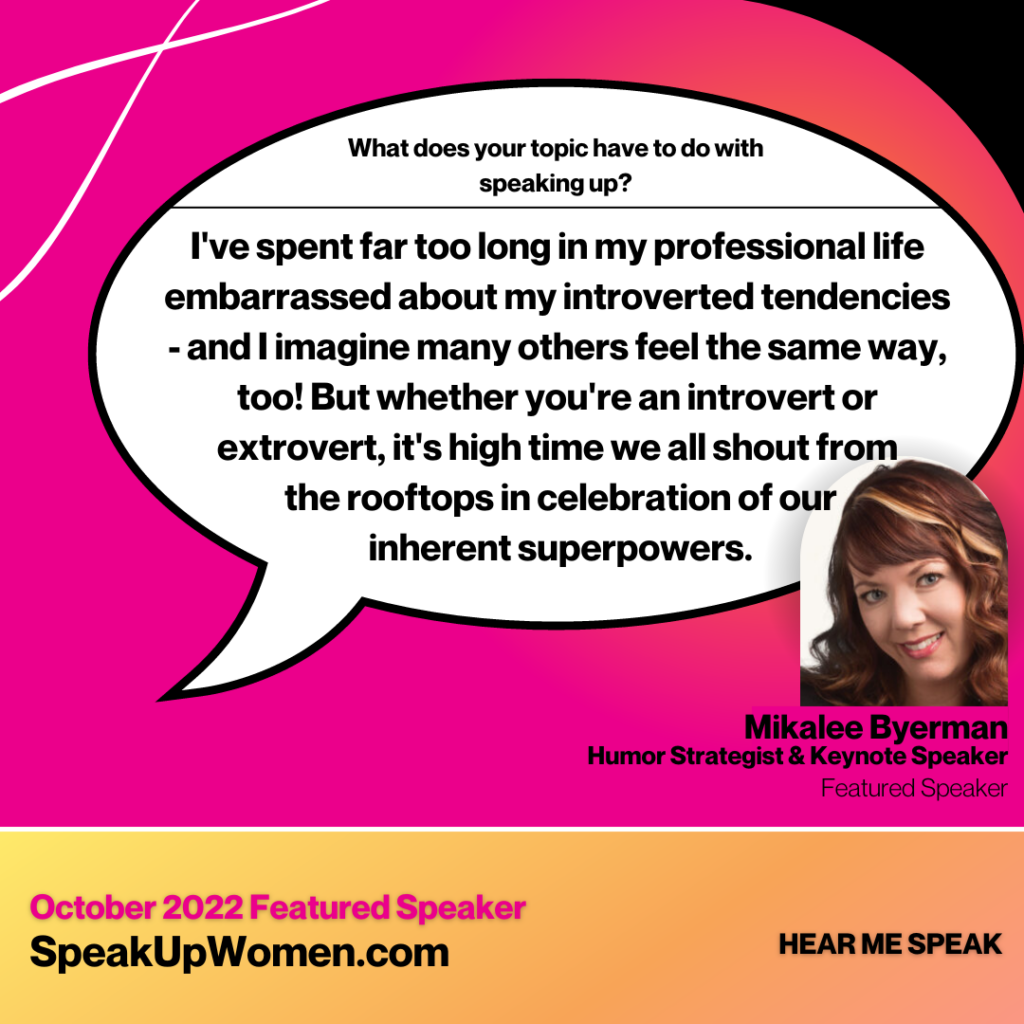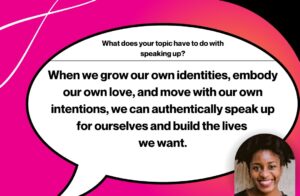I spent an embarrassing amount of time in my career pretending to be someone I wasn’t.
What’s worse is that it wasn’t even just a game of pretend; what I was telling everyone was totally, patently false — on multiple levels.
“I’m an extroverted introvert,” I would routinely say, not recognizing the sheer impossibility of this idea.
The inherent problem here is two-fold:
- One cannot be two opposite ends of the same spectrum. There is no such thing as an evil kind person (though evil people may have moments of kindness, but that is not the same thing). Similarly, there is no such thing as a paint color that is blackish white (which would obviously be a shade of gray), and brown-eyed people can’t have blue eyes (unless they are wearing contacts, obviously).
- I was too embarrassed to simply own my introversion.
You see, here’s the thing: Humans all fall along a spectrum — with introversion and extroversion on opposite extremes — so these terms reflect opposing ends of the spectrum for a singular construct. That construct is primarily about preferences for stimulation.
Susan Cain is a groundbreaking best-selling author about introversion and one of TED’s most popular speakers. In an interview with Scientific American, she described the difference between these extremes as the following: “Introverts prefer quiet, minimally stimulating environments, while extroverts need higher levels of stimulation to feel their best. Stimulation comes in all forms – social stimulation, but also lights, noise, and so on.”
There it is, the truth about this important personality trait: Introversion is more about a person’s preference for stimulation, rather than about shyness or outgoingness. Introverts in the workplace tend to recharge alone (read: not at networking events) and prefer quiet situations to generate their best ideas, whereas extroverts do their best thinking in groups while surrounded by abundant stimulation.
So Why Do Introverts in the Workplace (Me…I’m Talking About Me) Sometimes Lie?
For years, I had been led to believe that introversion is a cross to bear — something to overcome because I had been socialized to believe this, like many of us still today, that introversion = shyness and unfriendliness, and to be shy/unfriendly = to be socially awkward.
That doesn’t work for successful business people.
Hence, the game of make-believe, because I couldn’t be an introvert if I wanted to be a businessperson — or, better yet, a business leader. I knew that just wasn’t possible.
Here’s the rub: Many studies estimate that up to 50% of the world population is comprised of introverts. Further disturbing, some analysis suggests that only 2% of the world’s leaders identify as introverts.
So, are half the people in the world simply not wired to be thriving business leaders?
Of course not.
Introvert or Extrovert: Does It Even Matter?
It matters because we are all inherently predisposed — some would say wired — to exhibit preferences along the spectrum of these polar extremes. Yes, of course, over time, your preferences can slightly shift; but most scientists believe that barring any major upheavals, we are inclined to be slightly more introverted or extroverted (unless we’re that unicorn mid-point, the lucky few ambiverts) and will fall in somewhat the same range on the spectrum for most of our lives.
Shouldn’t introverts and extroverts alike want us all living our best professional lives?
I believe the answer is yes. We should celebrate our introversion or extroversion, without concerns about social stigmas or archaic belief systems. We are socialized to know the strengths of extroverts, and there are many — dynamic leadership abilities, a penchant for talking and brainstorming, and quick decisions among them.
Introverts at work have secret superpowers, too.
Superpower #1: Introverts Have Abundant Shower Thoughts
We have all had them: Shower thoughts are what I call those creative solutions to daunting workplace problems that happen in the most unexpected of places — which may literally be the shower or may be some other atypical location like the dentist chair, behind the wheel of your car, etc.
Why do I call these “shower thoughts”? Because the shower may just embody that perfect spot for quiet introspection — especially for introverts. Free of external concerns or noise, the falling water and mindless routine creates a breeding ground for ideas that bubble (see what I did there?) to the surface.
Experts agree that an introvert’s predisposition to valuing quiet may set them up for more abundant creative ideas and solutions. According to creativity and innovation expert Nick Skillicorn:
“In practice, extroverts are likely to use idea-generation sessions like brainstorming as a sort of ‘thinking out loud exercise’, saying whatever idea comes into their minds. The issue with this is that it doesn’t allow the brain much time to form truly original new connections between ideas, which means the likelihood of coming up with a truly differentiated, original idea is much lower.
Conversely, if introverts are given the opportunity to think through a challenge in their own way before being thrust into a group situation, they may take the time to form new solutions which can only come with giving the challenge the amount of time it requires. And often, this will happen subconsciously without the person even thinking about it.”
While public brainstorming is the norm in modern workplaces for idea generation and problem solving, perhaps the solution is simply — more showers, or more broadly, perhaps we simply need to provide more time and solitude for those subconscious thoughts and solutions to bubble to the surface.
Superpower #2: Introverts at Work Often Lead More Productive, Profitable Teams
While a 2010 Harvard study posits that extroverts may be better poised to lead passive teams (defined as teams with employees who simply follow commands), recent research offers this corollary: introversion may contribute to strong leaders who are more effective at leading proactive teams.
From a 2021 article on the Hustle called “65% of execs think introverts are bad leaders. Here’s why that’s BS”:
“Introverts are often more effective than extroverts at leading proactive teams because they don’t feel threatened by collaborative input, are more receptive to suggestions, and are more attentive to micro expressions…These benefits can have a measurable impact on profitability and productivity.”
This same article includes research showing that franchises of a major pizza chain with introverted leaders were 20% more profitable than franchises led by extroverts, and that teams challenged with a task that were led by the introverts were also up to 28% more productive.
The takeaway: Extroverted leaders are abundant in the modern workplace, but organizations looking for more creative problem-solving (that may potentially lead to more profit and productivity) may consider tapping the resources of their introverted team members.
Superpower #3: Introverts in the Workplace Are Thoughtful & Observant
In an interview with TIME Magazine, Dr. Jennifer Kahnweiler, author of The Introverted Leader: Building on Your Quiet Strength, noted:
“We [Introverts] notice things others might not notice because they’re talking and processing out loud…Although it may look like they’re just sitting quietly during a meeting, introverts are actually soaking in the information that’s being presented and thinking critically.”
While meetings may find introverts slightly quieter than their extroverted peers, that doesn’t mean we are not analyzing, reflecting or strategizing.
The TIME interview goes onto note that, “The typical introvert also uses his or her observant nature to read the room. They’re more likely to notice people’s body language and facial expressions, which makes them better at interpersonal communication.”
True power is in understanding a combination of verbal and nonverbal communication, which many introverts find themselves better able to process than their extroverted colleagues.
What It Really Means to Be an Introvert in the Modern Workplace: The Takeaways
Introverts in today’s workplaces may be hiding. They may be squashing the most important superpowers that can yield the best results. They may be pretending to be something they are not.
I think we can all agree that teams that are balanced by the strengths of an organization’s thriving introverts and extroverts is the optimal scenario. It’s time to celebrate introverts and extroverts alike.
Learn more about Mikalee and her journey at the Speak Up Women Conference.
If you enjoyed this article, join our newsletter and community at SpeakUpWomen.com to receive updates about new articles and events and our upcoming conferences.





